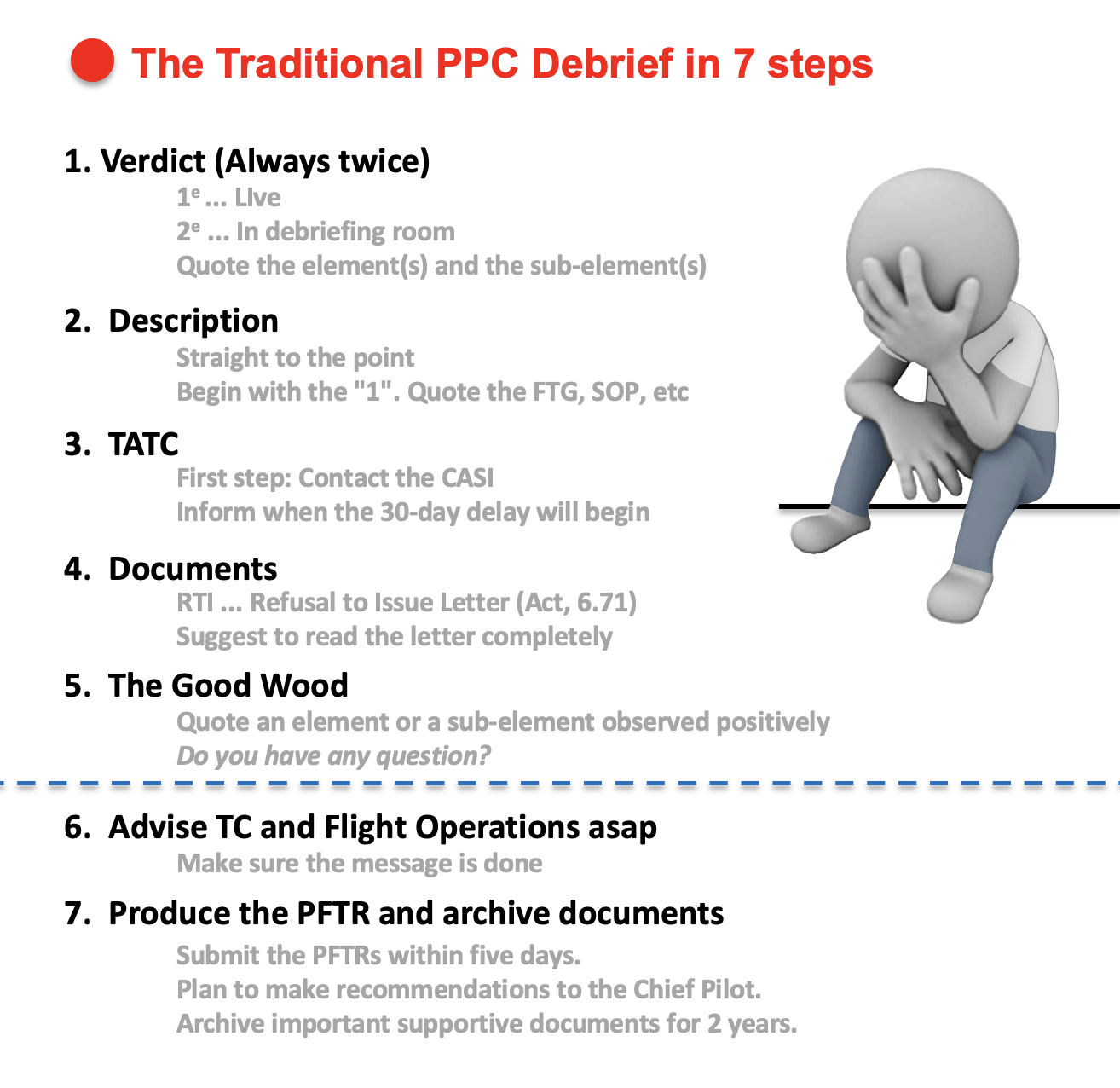Unsuccessful PPC Debrief
23-minute Video
Unsuccessful PPCs are debriefed using the traditional method (TP6533, 6.44). This debrief is challenging simply because you seldom do it. Indeed, you may run through a whole year without a single failure. When the outcome of a ride is unsuccessful, allow yourself 15 minutes alone after the ride but before meeting the pilots to reflect on how you will handle the session with them. The 7 steps are explained below.
1. Verdict. Verdict is always said twice. The first time at the moment the failure occurs, then once again, in the debriefing room. As explained in the video (link above), avoid "I failed you", "You failed". Say: "Unfortunately your PPC will not be issued today. It is about exercise # for you and exercise # for you. The performance didn't meet the criteria and we will discuss why. I will meet you both in Debrief Room A at 14h35. Please take your belongings with you." Avoid setting the meeting time in x minutes, but state the time (hours, minutes). Then, when you are ready, begin the debrief by stating the verdict again.
2. Describe the event leading to the failure. Begin with the exercise(s) marked "1". Summarize each event and avoid saying "I gave you a 1", "I failed you on that exercise". Always refer to the FTG and quote the Minister. You may say something like "...that performance is described in the FTG as a 1". "That performance matches the description of a 1". This will establish a good distance between yourself and what happened in the simulator. Remember that ACPs don't give marks or take ratings away. ACPs witness performances and match them with the descriptions in the 4-point marking scale.
Never quote the CAR or any enabled doccument from memory. If you wish to tie a score to a specific enabled reference, fetch it and take a screen capture on your ipad, or, write down the correct article prior to conducting the debrief. Keep debatable issues as close to the FTG as possible.
Once you have debriefed the exercise scored "1", offer to cover the other exercises scored "2" in chronological order. Some pilots could refuse to hear more. Don't insist but inform them that all exercises scored "1" or "2" will be documented on their respective PFTR report. A copy of their PFTR will be made available by the Chief Pilot, but only when the original will be completed, which could take up to 5 calendar days. At this stage, pilots cannot request a copy of your notes or the interim PFTR. Keep all your notes and documents inside the CQFA-supplied clipboard you received during your ACP course. Don't leave anyting on tables or the simulator's instructor console.
3. TATC. Remind the pilot(s) of the right to disagree. As per TP6533 7.7, the first step for pilots should be to request a review of the assessment by Transport Canada, provided they aren't (yet) pursuing a TATC review. "You have the right to disagree with the Flight Test Guide. The first step is to contact the POI. You may get the POI's contact information from the office of the Chief Pilot." In the event that a candidate isn't satisfied with the review, the option of requesting a review by the TATC remains available. Inform the pilot where to find the TATC web page and remind him/her there is a 30-day limitation delay but refrain from giving details which could make you liable in some ways. "You will have 30 days to file an application for review at TATC, from the date you receive the Refusal to Issue Letter." Don't explore TATC's web site with/for them. You may suggest the pilot(s) meet their union representative or P2P support team. This video (link below) explains the complete TATC process.
TATC for ACPs
15-minute Video
4. Refusal to Issue or Amend a CAD. Remind 70x pilots that ACPs don't serve suspension notices. Tell them they will receive a "Refusal to Issue/Amend Notice" from Transport Canada by registered mail. 604 pilots will not receive such letter from TC as their tests remain with the private operator. Receiving the notice may take weeks and by the time they get the actual letter, whether they are trained and successfully tested again or not. A failed initial PPC/IFR test will not trigger an IR issuance, but an IR rating, current or not, is never suspended. A failed PPC/IFR doesn't constitute a valid IPC. Any current rating still valid at the time of the failed PPC/IFR remains valid until:
- it is successfully renewed in a subsequent test, or
- it lapses by virtue of reaching the end of its validity period.
A failed Line Check doesn't trigger a suspension letter from Transport Canada and appropriate stakeholders including the Chief Pilot will be notified.
5. The good word. The good word should be structured, not simply improvised, to effectively tell the pilot he/she is much more than the exercise scored "2" or "1". Base your message on one of the 6 elements you observed positively, ideally a non-technical element. Learn a formatted sentence like:
Let's take a moment to see how the Flight Test Guide
describes a cockpit with optimum (sub-element).
(describe why this went well)
Clearly, this is one of your strengths you
can build on. Do you have any questions?
You may feel bad about the candidates' failure. Don't promise things in the name of the Minister or others, such as "Don't worry, you will be trained and back on the line before you know it." You don't know what will happen next. You may offer your own time if you want. "We are here to help." Never underestimate the power such good notes have on your fellow pilots going through a rough time.
At this point, the pilots leave the building.
6. Advise Transport Canada. Make a note to advise TC and Flight Operations as soon as possible. If someone in your company is in charge of this, make sure it will be done, as you hold the ACP delegation, not that person.
7. Collect and archive for 2 years the following documents. They will be requested by Transport Canada if the case is heard at TATC.
- A full copy of the PPC script or the Action Plan you used
- Your personal notes.
- Relevant SOPs, valid the day you conducted the test.
- A copy of the simulator/aircraft log showing the failed PPC entry.
- Your assignment to the PPC by the operator (it could be a copy if your monthly schedule).
- Relevant references (FCOM, QRH, MEL, Wx if airborne). Make copies now since it could take more than a year before the TATC revision is heard.
- A copy of your Letter of Delegation valid the day you conducted the test, as well as a copy of the last ACP Monitor Report before that day.
Your recommendations to the Chief Pilot are crucial for steering the Training Department and for future PPC scripts development.


